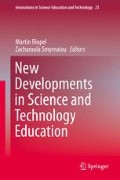Abstract
An approach to pedagogy that links teaching and research needs to be promoted in higher education. This paper reflects on how the Centre for Innovation and Workplace Learning at Dublin City University (DCU) is supporting teachers to examine their own professional practice within a community of practice. We will describe the background to the EU ‘Inspiring Science Education’ (ISE) project, which aims to provide digital resources and opportunities for teachers to make Science education more relevant to students’ lives. The shift towards an Inquiry Based Learning (IBL) approach in Science and Maths education in the post-primary curriculum in Ireland will be discussed. Finally, we will show by example how we are making use of webinars to support a group of ISE Science teachers to integrate IBL with the support of e-tools and resources into their repertoire of classroom strategies.
Access this chapter
Tax calculation will be finalised at checkout
Purchases are for personal use only
References
Anderson, R. (2002). Reforming science teaching: What research says about inquiry. Journal of Science Teacher Education, 13(1), 1–12.
Bolton, G. (2010). Reflective practice, writing and professional development (3rd ed., p. xix). California: SAGE publications.
Brookfield, S. (1998). Critically reflective practice. Journal of Continuing Education in the Health Profession, 18(4), 197–205.
Conway, P.F., Murphy, R., Rath, A., & Hall. K. (2009). Learning to teach and its implications for continuum of teaching education: A nine-country cross-national study, Teaching Council of Ireland. Accessed http://www.teachingcouncil.ie/_fileupload/Publications/LearningToTeach-ConwayMurphyRathHall-2009_10344263.pdf
Department of Education and Science. (2006). Strategy for science, technology and innovation report. Accessed http://www2.ul.ie/pdf/35659989.pdf
Department of Education and Skills. (2012). A framework for junior cycle. Accessed http://www.education.ie/en/Publications/Policy-Reports/A-Framework-for-Junior-Cycle-Full-Report.pdf
Dewey, J. (1933) How We Think. A restatement of the relation of reflective thinking to the educative process (Rev. edn.), Boston: D. C. Heath.
Lave, J., & Wenger, E. (1991). Situated learning: Legitimate peripheral participation. New York: Cambridge University Press.
National Council for Curriculum and Assessment. (2005, October). Review of mathematics in post-primary education. Retrieved February 15, 2012, from http://www.ncca.ie/en/Publications/Consultative_Documents/Review_of_Mathematics_in_PostPrimary_Education.pdf
National Council for Curriculum and Assessment. (2006, April). Review of mathematics in post-primary education – report on the consultation. Retrieved April 20, 2012, from http://www.ncca.ie/uploadedfiles/mathsreview/Maths_Consult_Report.pdf
National Council for Curriculum and Assessment. (2008, February). Project maths: developing post primary mathematics education. Retrieved June 1, 2012, from http://www.ncca.ie/uploadedfiles/publications/vacancies/project%20maths%20overview.pdf
OECD. (2009). Creating effective teaching and learning environments: First results from TALIS. Accessed http://www.oecd.org/edu/school/creatingeffectiveteachingandlearningenvironmentsfirstresultsfromtalis.htm
Schön, D. (1983). The reflective practitioner, How professionals think in action. NewYork: Basic Books.
Author information
Authors and Affiliations
Corresponding author
Editor information
Editors and Affiliations
Rights and permissions
Copyright information
© 2016 Springer International Publishing Switzerland
About this chapter
Cite this chapter
Crotty, Y., Farren, M., Owen, M. (2016). Pedagogy as an Inquiry Approach to Teaching: Inspiring Science Educators Through CPD Webinars. In: Riopel, M., Smyrnaiou, Z. (eds) New Developments in Science and Technology Education. Innovations in Science Education and Technology, vol 23. Springer, Cham. https://doi.org/10.1007/978-3-319-22933-1_17
Download citation
DOI: https://doi.org/10.1007/978-3-319-22933-1_17
Published:
Publisher Name: Springer, Cham
Print ISBN: 978-3-319-22932-4
Online ISBN: 978-3-319-22933-1
eBook Packages: EducationEducation (R0)

